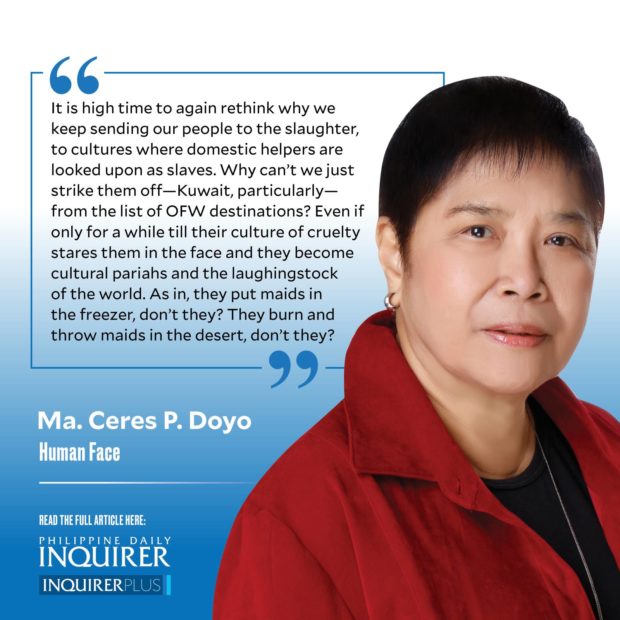From freezer to fire in Kuwait
In 2018, the corpse of a Filipino overseas worker (OFW) who was a domestic helper in Kuwait was found in a freezer. Joanna Demafelis’ employers, a Syrian-Lebanese couple living in Kuwait (and possibly with a Kuwaiti mindset), left their rented domicile with the freezer still on, and in it the body of Demafelis frozen for a year before it was discovered.
Two weeks ago, the burned corpse of an OFW-domestic helper, Jullebee Ranara, was found in a Kuwait desert, thrown there for predators to devour, by her alleged killer, a teenage son of her employers.
The manner in which they were killed is one thing, but the ways their bodies were disposed of or hidden are so sickening they should belong to the encyclopedia of crimes of the vilest kind against OFWs for future generations to read.
These two crimes alone are stranger than the US crime series on cable TV and Netflix, where the cases almost always end up solved and the perpetrators brought to justice. Enough for you to believe that there is justice in this world.
OFWs in the Middle East have had it bad, and if their tales of woe would be compiled, it would be voluminous. I have written a good number myself, some so bloody and tragic (and heartwarming ones, too) they cry to heaven for vengeance, but more importantly, they raise the question: How have our compatriots come to this?
For decades, nay, almost half a century, many OFWs have been carrying the burden their host countries would rather not carry, housework foremost among them, because they have the money to pay those they look upon as slaves. These slaves might have had higher education than some members of their wealthy employers’ families. Their maids could have been school teachers/principals back in their homeland. So do these employers resent it or do they resent it?
And there are other factors besides. Namely that these employers might have had little or no values education enough to make them realize that outside of their cultural and religious circles are human beings who have the same rights as they have. Yet we worship the same God we call by different names.
And, oh, remember OFW in Kuwait Luzviminda Siapo (“No name for her pain,” my April 13, 2017 column)? Her son, Raymart, who had a club foot, was running for his life when he was shot dead, one of the thousands of casualties of President Duterte’s dirty war on drugs. Siapo, whose given name Luzviminda is the representation of the Philippine islands, had to kiss the feet of her Kuwaiti employer three times, so she would be allowed to go home and bury her son. Mater dolorosa personified.
Caloocan Bishop Pablo Virgilio David to Luzviminda: “My heart was crushed when I read the news. I could not swallow the bread I was eating, so I decided to tell you that we are here for you.”
So what is it about them? And what is it about us? It is high time to again rethink why we keep sending our people to the slaughter, to cultures where domestic helpers are looked upon as slaves. Why can’t we just strike them off—Kuwait, particularly—from the list of OFW destinations? Even if only for a while till their culture of cruelty stares them in the face and they become cultural pariahs and the laughingstock of the world. As in, they put maids in the freezer, don’t they? They burn and throw maids in the desert, don’t they?
I remember how I closely followed the 1990 invasion of Kuwait by Iraqi forces with their flying scud missiles seen on TV. Brought to us by journalists in the war zone, mind you. I remember US Gen. Norman Schwarzkopf’s Operation Desert Storm, an extensive air campaign along with international forces, driving out Saddam Hussein’s forces. It was like a movie playing out to save Kuwaitis and their oil fields. But do ordinary Kuwaitis remember and pay back with compassion? I am speaking as a resentful Filipino citizen. I. Am. Not. Sorry.
And so dispatching more OFWs to Kuwait need not be stopped, the Department of Migrant Workers tells us. The silence of the lambs. Where is the fierceness?
—————-
Send feedback to cerespd@gmail.com





















